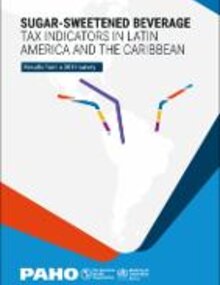Obesity, overweight, and diet-related noncommunicable diseases (NCDs) represent both a major public health challenge and a serious threat to economic and social development in the Region of the Americas. Over the last 20 years, the prevalence of adult overweight and obesity has increased substantially (62.5% overweight and 28.6% obesity in 2016), representing the highest among all World Health Organization (WHO) regions. Prevalence rates have also grown significantly among children and adolescents, with available data showing that 20% to 25% are overweight or obese. The scientific evidence is robust on the link between specific dietary intake patterns and the development of obesity, overweight, and related NCDs. In particular, sugar-sweetened beverages (SSBs) have been singled out as one of the largest drivers of the obesity epidemic. In Latin America and the Caribbean, the mortality rate attributable to SSBs is higher than in any other region. WHO recommends reducing sugar consumption through effective taxation of SSBs as part of a menu of cost-effective, evidence-based policies in the WHO Global Action Plan for the Prevention and Control of NCDs 2013–2020. Taxes on SSBs represent a triple win for governments because they 1) improve population health, 2) generate revenue, and 3) have the potential to reduce long-term associated healthcare costs and productivity losses. Although 21 out of the 33 Latin American and Caribbean Member States of the Pan American Health Organization (PAHO) apply excise taxes on SSBs, there is great heterogeneity in their design and rates, and most could be further leveraged to improve their impact on SSB consumption and health. Developing a tax share indicator is necessary to monitor taxes on SSBs, enable standardized comparisons across countries and over time, establish best practices in tax design, and provide a powerful tool for advocacy. Since 2016, the Department of Noncommunicable Diseases (NMH) at PAHO has been working on developing standardized and comparable indicators of the share of indirect taxes in the retail price of SSBs. Building on this experience and the WHO methodology for monitoring tobacco taxes, this brochure presents the results of pioneer tax share and complementary price and tax policy indicators for nonalcoholic beverages in 27 Latin American and Caribbean PAHO Member States. This brochure is a tool for data dissemination to the different sectors involved in SSB taxation in Latin America and the Caribbean, and to help countries in designing, planning, and evaluating SSB taxes in order to reduce SSB consumption.
|

